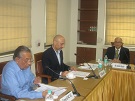Dr William Antholis, Managing Director, Brookings Institution interacted with the VIF faculty on 09 September, 2014 on the current state of India, China and US relations and the emerging dynamics. Speaking on ‘India, China and the US- Which Way Does the Triangle Tilt’, Dr Antholis dwelt on the differences between the coastal provinces and the internal areas in China, the political and social interest and a gamut of governance problems and related issues. He compared Modi’s governance model to China’s model of governance. Speaking about the relationship between India, China and the US, he said while there is some congruence of views between India and China at the global level, there are strategic differences especially due to the unresolved border dispute. The US- China relations have both cooperative and competitive elements, he said adding strategic tensions between China and US persist. He was of the view that Trans Pacific Partnership should be the one China should aspire for as it is superior to WTO because of higher standards set by TPP. There are American concerns about China’s approach to climate issues and its assertiveness in East China and South China Seas. Between India and US there are differences on climate issues, Trade Facilitation Agreement and Civil Nuclear Liability Law. India runs a trade surplus with the US. The joint military exercises between the two countries and their frequency has been increasing. India has strong bipartisan support in the Congress; both Democrats and Republicans love India. However, there are still many challenges to a robust Indo-US relationship including differences on defence and security issues such as Iran.
Dr. Antholis was of the view that the triangle tilts in favour of India. He was impressed by energy and enthusiasm imparted by PM Modi to the current discourse in India. Modi is committed to support democracy and transparency. The coming visit of Modi to the US is an opportunity to address some of the issues though no big ticket issues might be resolved.
In the interactive session, there were questions on the regional situation especially in view of the new threat of ISIS in West Asia. There was a discussion on Shale oil and gas and the possibility of its export. Questions on China and its strategic approach were also discussed. It was felt that a strong India in itself is a stabilizing factor in the region and that is in the national interest of the US.








